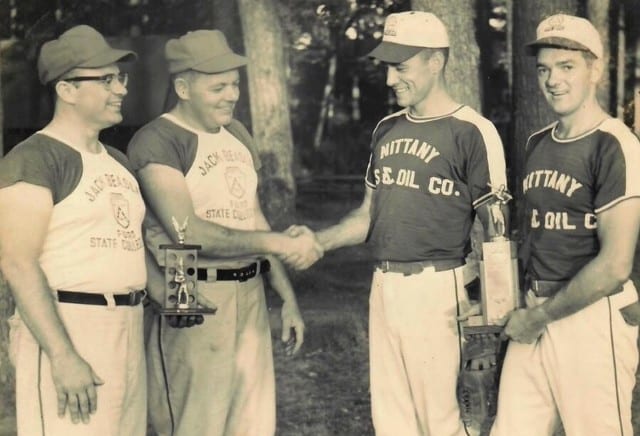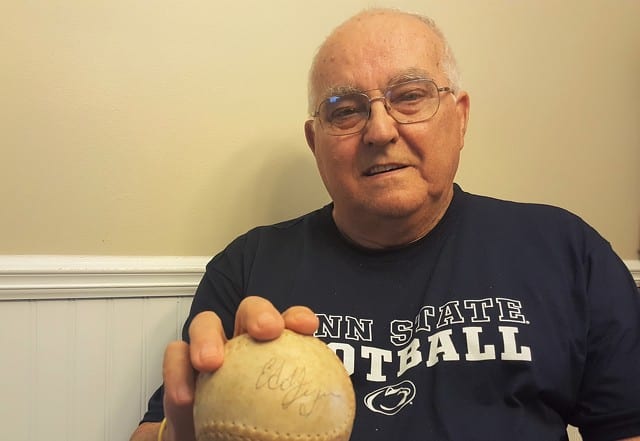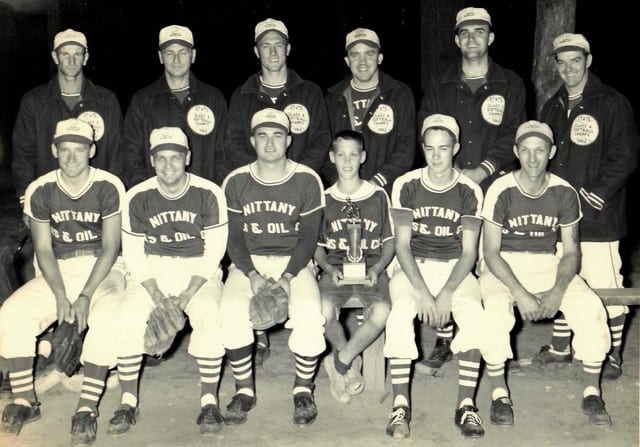They were the summertime sensations playing big-time ball on a small diamond. They were the local kings of the fastpitch softball craze that peaked in the 1960s and 1970s. They were the “Oilers”—members of the Nittany Gas and Oil softball team that drew big crowds and grabbed huge headlines in the two local newspapers.
Some would say these fastpitch heroes have since been forgotten. But, of course, “forgotten” is a relative term. I know I’m not the only person who still recalls the Oilers and their rival teams — many of which were sponsored by companies like Beasley Ford, Erie Tech and HRB-Singer that have undergone name changes.
“It was, I think, bigger than the baseball leagues,” says Dutch Frey, a sensational leadoff hitter for the Oilers from 1969 to 1976, as he talks about the State College Rec League. “We would get great crowds.”
“We had as many people (fans) as the County League had,” notes Galen Dreibelbis, the team’s sponsor from its birth in 1958 until its demise in the early 1980s.
Although the Oilers began with some strong players in 1958, they became dominant when Dreibelbis recruited pitcher Bill Pennabaker to join them in 1959. In his first three years of State College league competition, the Bellwood native posted a record of 54-5 with an earned run average of 0.88. In other words, almost no one in the league could handle Pennabaker’s fastball, curveball or drop. Then, in the 1962 state championship tourney, the Oilers stunned the traditional powers of Pennsylvania softball when pitcher Bill led them to the title.

Nittany Gas and Oil won its third straight title in the State College Rec League by defeating Beasley Ford in 1962. Here, Beasley’s Joe Stabler congratulates Galen Dreibelbis while Nick Pelick (left) and Bill Pennabaker (right) look on.
PENNABAKER’S ENDURANCE
Known for his figure 8 delivery, the flashy Pennabaker also brought mounds of determination to the mound. At the ‘62 state tournament, he pitched 39 innings out of the 51 that were played by the Oilers. And he was the winning pitcher in Nittany Gas and Oil’s final two contests—both of which were must-wins in the quest for a title. Those final two games were played within one four-hour period, so Pennabaker’s gritty endurance was on full display.
“Everybody contributed,” says Dreibelbis as he reflects on the 1962 title. “But I don’t know that anybody in particular — other than the heart of Bill Pennabaker — took us to the state championship. We were pretty well respected. But probably nobody thought we could win the state because there were big teams in Williamsport, York, Lancaster, the Chester area and Lansdale.”
* * *
The Oilers’ saga began as a subplot to one man’s fulfillment of the American Dream. Galen Dreibelbis was born in a Ferguson Township farm house just 500 yards from the home where he now lives. And as he thinks back to his boyhood in that house, Dreibelbis marvels over memories of his mother, Ruth Herman Dreibelbis.
“She raised five children in that house,” says the veteran State College business leader and former state representative. He notes that his mom cooked on a wood stove and that the home lacked indoor plumbing.
“It was a tough life, but she didn’t even flinch,” says Dreibelbis. “She was very, very special. She still delivered for Meals on Wheels in her 80s, and she lived to just three months shy of 107.”
Dreibelbis yearned to play sports during his years at State College High School, but the realities of farm life got in the way. Was he allowed to play baseball? “No, that was seeding time on the farm.” How about football? “No, the fall was when the harvest came — mainly corn. The only thing I was allowed was one winter sport.”
And so Galen joined the State High wrestling team, became a varsity regular for three years and gained a lifelong passion for the sport. Blessed financially through various endeavors (including Nittany Gas and Oil which he founded in 1958 and sold in 1982), Dreibelbis has generously supported Penn State wrestling. Now looking forward to his 70th season of following the Nittany Lions, he considers his attendance at their 2011 NCAA national championship as his greatest sports thrill.
Of course, that’s not saying Dreibelbis lacked enthusiasm for the exploits of his Oilers. His commitment to the team was a passionate one. From the standpoint of participation, he served as player-manager from 1958 to 1969, stepping down in 1970 to devote time to his ultimately successful campaign for the state House of Representatives.
Even though he never returned to his on-field roles, Dreibelbis continued to serve generously as the team’s sponsor. He built the Hess Field complex on Shingletown Road, dressed his players in the sharpest uniforms around and paid for the wives and children to travel to weekend tournaments.
“I loved sports,” notes Dreibelbis. “And because I was a farm kid, I wasn’t allowed to participate in all the ones I wanted to. So I guess I played my kids’ games a little later.”

Galen Dreibelbis always loved sports, and fastpitch softball allowed him to fill in some gaps created by his farm upbringing.
* * *
Not only did the Oilers achieve surprising success in the record books, but they also brought plenty of entertainment to area fans.In fact, three of the top pitchers in softball history made their way to Happy Valley because of Nittany Gas and Oil’s reputation and Dreibelbis’ contacts in the sport:
-
Ty Stofflet, often described as “softball’s Sandy Koufax,” led his Reading Rising Sun Hotel teammates to Hess Field for a doubleheader in the 1970s. Stofflet pitched the first game and, not surprisingly, he threw a one-hit shutout as the Sunners triumphed, 1-0. A lefty who was capable of throwing 104 miles per hour, Stofflet led his Reading team to the Amateur Softball Association national title in 1975, 1977 and 1978. And in 1976, that team won the World Softball Championship as Stofflet threw a no-hitter for 20 innings to defeat New Zealand.
-
Eddie Feigner made the first of two State College appearances in a game that was played on Memorial Field in the early 1970s. Feigner (pronounced FAY-ner) and three other players began their barnstorming shtick in 1946, so “The King and His Court” were aging by this time. Frey hit a double off Feigner, Dreibelbis smacked a single and former Penn State linebacker Ed O’Neil crushed a home run.
The game was tied 4-4 in the sixth and Frey was up to bat with two outs and Chuck Cronemiller on third base. “I was ready to punch that thing and get Chuck in,” recalls Frey. “But the catcher said to umpire Charlie Breon, ‘Call this one a strike.’ So the King wound up, the catcher jumped up and banged his glove and Charlie said, ‘Strike three, you’re out!’ Feigner never threw the ball. So I said, ‘Charlie, did you forget your glasses tonight?’ He just laughed. We knew it was all just entertainment.
-
Not to be outdone by The King and His Court, Rosie Black and her three teammates (“The Queen and Her Court”) also made an appearance against the Oilers. “I’ll tell you,” says Frey, “I had a tough time trying to hit her. She could throw harder than the King at that time. She was tough.” Did she strike you out, Dutch? “Yep, I hate to admit that. But I wasn’t the only one who struck out.”
Although such exhibitions offered laughter and special tricks (Feigner often pitched from second base while wearing a blindfold), normal Oiler games were serious business. Certain rivalries developed with other regional powers — such as Milton — who typically played at the same weekend tournaments.
INTENSE RIVALRY
“Milton and us were just like cats and dogs,” says Frey, “and they had a catcher who was pretty rough and very aggressive. And Dick Harvey (the Oilers’ second baseman) would never back down from any of that stuff.
“When Dick came up to bat, the catcher was talking to him about us being losers and really egging into him. Dick got on first base, and then Pennabaker laid down a bunt. Milton threw the ball past first base and into right field. Dick Harvey comes around and scores, so he says to the catcher, ‘We’re winners. What are you guys?’ And the catcher took off his shoes and threw them over the bleachers and onto the road.”
No discerning person would have ever described Nittany Gas and Oil as “losers,” especially when Pennabaker was in his prime. Why was the Oilers’ pitcher so effective? “Confidence,” says Frey. “He knew he could beat you. Some people may have thought he was a little cocky, but people who knew Bill knew that he was very confident and very good.”
“Dutch is right,” says Dreibelbis. “If you made an error and went to apologize on the field, Bill would say, ‘That’s all right. I’ll strike the next guy out.’ “
DWINDLING TO DEATH
By the late 1970s, local interest in men’s fastpitch began to dwindle, and by the early 1980s there weren’t enough teams to sustain the State College Rec League. Nittany Gas and Oil joined the Lewistown league for one year, but everyone could see the writing on the wall.
“We had to quit,” says Dreibelbis, “because fastpitch gave way to slowpitch. It kind of faded away.”
And why was that, Galen? “Younger people at that time didn’t like the challenge of a pitcher throwing the ball past them. They wanted to hit the ball out of the park, and they could do that in slowpitch. There were players who could have played fastpitch, but they wanted to hit 20 home runs instead of batting .250 against good pitching. They didn’t have the competitive spirit that the fastpitch players did.”

Dutch Frey still remembers hitting this ball off pitcher Eddie Feigner when the Oilers played “The King and His Court.”



